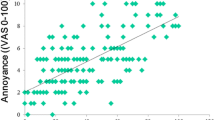Abstract
The study was proposed to evaluate co-morbid depression, anxiety and stress associated with tinnitus patients. The study was done on 196 subjects: 100 patients suffering from subjective tinnitus associated with hearing loss (tinnitus group), 45 patients suffering from hearing loss only (hearing loss group) and 50 healthy subjects not suffering from tinnitus or hearing loss (control group); the age ranges from 20 to 60 years old. The studied sample was subjected to full ear, nose and throat examinations and audiological evaluation. Depression, Anxiety and Stress Scale (DASS) was developed by Levibond H and Levibond F to assess three self-report scales designed to measure the negative emotional status of depression, anxiety and stress. All patients and control group were evaluated by DASS. (1) Depression: males were affected more than females. All patients over 60 years were affected by depression. The duration of tinnitus seems correlating with the severity of depression. Only 2 patients (4.3 %) of the hearing loss group suffer from depression. (2) Anxiety: 90 % of males suffer from anxiety as compared to 83.3 % females. The age group 20–29 years old suffers more than other age groups. Only 4 patients (8.7 %) of hearing loss group suffer from anxiety. (3) Stress: females seem to be affected by the stress (76.7 %) more than males (67.5). Patients in age group 30–39 suffer the most from the disease. There is a direct correlation between duration of tinnitus and severity of stress. No one of the hearing loss group suffers from stress. In conclusion, depression, anxiety and stress should be taken into consideration in the treatment of patients suffering from tinnitus.



Similar content being viewed by others
References
Martinez-Devesa P, Perera R, Theodoulou M, Waddell A (2010) Cognitive behavioural therapy for tinnitus. Cochrane Database Syst Rev. doi:10.1002/14651858.CD005233.pub3
Kraus KS, Canlon B (2012) Neuronal connectivity and interactions between the auditory and limbic systems. Effects of noise and tinnitus. Hear Res 288:34–46
Holmes S, Padgham ND (2011) Ringing in the ears: narrative review of tinnitus and its impact. Biol Res Nurs 13:97–108
Konig O, Schaette R, Kempter R, Gross M (2006) Course of hearing loss and occurrence of tinnitus. Hear Res 22:59–64
Langguth B, Salvi R, Elgoyhen A (2009) Emerging pharmacotherapy of tinnitus. Expert Opin Emerg Drugs 14:687–702
Levibond H, Levibond F (1995) Manual for Depression, Anxiety and Stress Scales. Psychology Foundation, Sydney
Brown A, Chorpita F, Korotitsch W, Barlow H (1997) Psychometric properties of the Depression, Anxiety and Stress Scales (DASS) in clinical sample. Behav Res Ther 35:79–89
Hoffman HJ, Reed GW (2004) Epidemiology of tinnitus. In: Snow JB (ed) Tinnitus: Theory and Management. BC Decker, London, pp 16–41
Adoga AA, Adoga AS, Obindo JT (2008) Tinnitus and the prevalence of co-morbid psychological stress. Niger J Med 7:95–97
Zielińska-Bliźniewska H, Olszewski J (2009) Tinnitus and depression. Otolaryngol Pol 63:20–23
Shargorodsky J, Curhan GC, Farwell WR (2010) Prevalence and characteristics of tinnitus among US adults. Am J Med 123:711–718
Wallén MB, Hasson D, Theorell T, Canlon B (2012) The correlation between the hyperacusis questionnaire and uncomfortable loudness levels is dependent on emotional exhaustion. Int J Audiol 51:722–729
Belli S, Belli H, Bahcebasi T, Ozcetin A, Alpay E, Ertem U (2008) Assessment of psychopathological aspects and psychiatric comorbidities in patients affected by tinnitus. Eur Arch Otorhinolaryngol 265:279–285
Ooms E, Meganck R, Vanheule S, Vinck B, Watelet JB, Dhooge I (2011) Tinnitus severity and the relation to depressive symptoms: a critical study. Otolaryngol Head Neck Surg 145:276–281
Langguth B, Landgrebe M, Kleinjung T, Sand GP, Hajak G (2011) Tinnitus and depression. World J Biol Psychiatry 12:489–500
van Veen ED, Jacobs JB, Bensing JM (1998) Assessment of distress associated with tinnitus. J Laryngol Otol 112:258–263
Halford JB, Anderson SD (1991) Anxiety and depression in tinnitus sufferers. J Psychosom Res 35:383–390
Crocetti A, Forti S, Ambrosetti U, Bo LD (2009) Questionnaires to evaluate anxiety and depressive levels in tinnitus patients. Otolaryngol Head Neck Surg 140:403–405
Alessandra F, Alberto E, Marco F (2011) New trends in tinnitus management. Open Neurol J 5:12–17
Reynolds P, Gardner D, Lee R (2004) Tinnitus and psychological morbidity: a cross-sectional study to investigate psychological morbidity in tinnitus patients and its relationship with severity of symptoms and illness perceptions. Clin Otolaryngol Allied Sci 29:628–634
Zöger S, Svedlund J, Holgers M (2006) Relationship between tinnitus severity and psychiatric disorders. Psychosomatics 47:282–288
Krog H, Engdahl B, Tambs K (2010) The association between tinnitus and mental health in a general population sample: results from the HUNT study. J Psychosom Res 69:289–298
Hébert S, Canlon B, Hasson D (2012) Emotional exhaustion as a predictor of tinnitus. Psychother Psychosom 81:324–326
So-Young L, Ji-Hae K, Sung-Hwa H, Dong-Soo L (2004) Roles of cognitive characteristics in tinnitus patients. J Korean Med Sci 19:864–869
Canlon B, Theorell T, Hasson D (2013) Associations between stress and hearing problems in humans. Hear Res 295:9–15
Hasson D, Theorell T, Wallen M, Leineweber C, Canlon B (2011) Stress and prevalence of hearing problems in the Swedish working population. BMC Public Health 11:130. doi:10.1186/1471-2458-11-130
Conflict of interest
None.
Author information
Authors and Affiliations
Corresponding author
Rights and permissions
About this article
Cite this article
Gomaa, M.A.M., Elmagd, M.H.A., Elbadry, M.M. et al. Depression, Anxiety and Stress Scale in patients with tinnitus and hearing loss. Eur Arch Otorhinolaryngol 271, 2177–2184 (2014). https://doi.org/10.1007/s00405-013-2715-6
Received:
Accepted:
Published:
Issue Date:
DOI: https://doi.org/10.1007/s00405-013-2715-6




